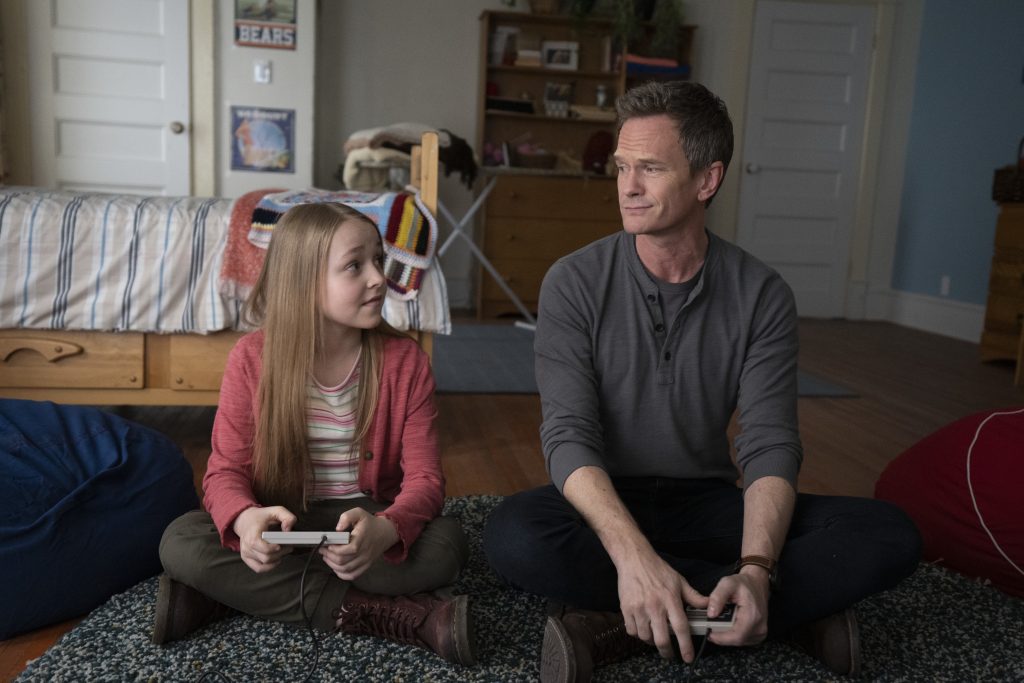February 14, 2024
by Carla Hay

Directed by Leah McKendrick
Some language in Spanish with subtitles
Culture Representation: Taking place in the Los Angeles area, the comedy/drama film “Scrambled” features a predominantly white cast of characters (with a few African Americans, Latin people and Asians) representing the working-class, middle-class and wealthy.
Culture Clash: A 34-year-old free-spirited bachelorette, who has no idea if she will ever find a life partner or if she’ll ever be ready to be a parent, decides to freeze her eggs anyway while she still looks for love.
Culture Audience: “Scrambled” will appeal primarily to people who are interested in comedies about dating and fertility issues.

Even though “Scrambled” occasionally stumbles into a cliché sitcom tone about a bachelorette in her 30s who’s unhappy in her love life, this adult-oriented comedy has entertaining performances in this story about a single woman who wants to freeze her eggs. “Scrambled” was very obviously influenced by HBO’s 1998 to 2004 comedy series “Sex and the City” (with frank talk and explicit scenes about sex), but “Scrambled” is more of a tribute than a ripoff. Just like in “Sex and the City,” the narrator is a single, liberated woman in her 30s with a messy life of failed romances with ex-boyfriends, financial instability, and the nagging feeling that she should have her life figured out by now.
“Sex and the City” and “Scrambled” also drew inspiration from real-life people. Carrie Bradshaw, the main protagonist of “Sex and the City,” lives in New York City and is a sex columnist. The Carrie Bradshaw character is based on real-life writer Candace Bushnell. Leah McKendrick is the writer, director and star of “Scrambled,” where she portrays main protagonist Nellie Robinson, a Los Angeles-based jewelry designer who works from home and who experiences fertility issues that McKendrick experienced in real life. McKendrick makes an impressive feature-film directorial debut with “Scrambled,” which had its world premiere at the 2023 SXSW Film & TV Festival.
“Scrambled” begins with a somewhat stereotypical setting for a movie about a lovelorn bachelorette: a wedding where she is a bridesmaid. Nellie, who is 34, is at the wedding of her best friend Sheila (played by Ego Nwodim) and wants to make a grand entrance with her date Conor (played by Henry Zebrowski), because she tells Conor it’s a tradition that’s expected of her, as someone who ends up being a bridesmaid at many weddings. In the movie’s opening scene, which takes place before the wedding ceremony begins, Nellie is shown debating with Conor about what type of dance they should start with at the wedding reception. She nixes the idea of doing the Running Man, but Nellie says that recreating iconic dance scenes from “Grease” or “Dirty Dancing” could still be in the realm of possibility.
Nellie goes to check on Sheila in a dressing room and sees that Sheila is a nervous wreck. Sheila babbles to Nellie about Sheila’s groom-to-be Ron (played by Max Adler), by asking this hypothetical question: “Would you fuck Ron for the rest of your life?” It’s Sheila’s way of asking if Nellie thinks Sheila is making the right decision to marry Ron and stay faithful to him. Like a good friend, Nellie says, “Yes.”
Sheila then rambles on to Nellie about how she and Nellie always thought that they weren’t the marrying type, and now here they are on Sheila’s wedding day. Sheila then asks Nellie if Nellie has some cocaine because Sheila wants to do some cocaine before the ceremony. Sheila nearly has a meltdown when Nellie says she doesn’t have any drugs. But then, Nellie remembers she might have some molly. Nellie and Sheila take the molly together—until Sheila abruptly announces that she’s pregnant, and then Nellie orders her to spit out the pill.
This scene sets the tone for the rest of “Scrambled,” which is revels in its raunchiness and crudeness in ways to make viewers laugh. At the wedding, Nellie is very stoned on the molly, but during the reception she gets a sobering lecture from an older friend named Monroe (played by June Diane Raphael), whose time in the movie is brief (less than 10 minutes) but it’s one of the funniest scenes in the movie. Monroe and Nellie are sitting at the same table when Nellie gushes to Monroe about how Nellie considers Monroe to be her “idol,” because Monroe seems to “have it all” as a wife, mother, and the owner of a successful business.
Monroe has brought her only child—a daughter named Zofia (played by Everly Taylor)—to the wedding. Zofia, who’s an energetic child and about 5 or 6 years old, was born when Monroe was in her early 40s, after Monroe went through in vitro fertilization treatments to get pregnant. Monroe then gives a raw and candid confession that although she loves being parent, the process of conceiving and giving birth was hellish for her. (She says it in a way that’s a lot cruder than that.) Monroe spent $50,000 on IVF treatments and says if she had to do it all over again, she would’ve frozen her eggs when she was younger and would’ve had a surrogate for the pregnancy.
Monroe also asks Nellie how her love life is, and Nellie responds that she’s single and actively dating: “It’s a smorgasbord. I’m seeing everyone.” Monroe then looks at Nellie sympathetically and says, “I know you because I was you. And so, the next time you’ve just boned some hot bartender with an app idea, and you’re sitting in his bathroom, staring at his shower encrusted with pubes and that fucking “Fight Club”/”Reservoir Dogs”/”Scarface” poster, I want you to remember my face.”
Monroe adds when she comments on men not having an age limit for conceiving children: “They can be in never never land, never growing up, never aging. But these eggs, those huevos rancheros? They are [aging], those eggs are!” When Monroe asks Nellie how old she is, and Nellie tells her 34, Monroe slaps Nellie on the face, and tells her not to admit that she’s older than 33. Monroe then sternly warns Nellie: “Freeze those eggs!”
After Monroe leaves the table, Nellie makes eye contact with a “hot bartender”(played by Matt Pascua) at the wedding reception and gets a drink from him. She and the bartender end up going back to his place, where they have sex. And sure enough, this bartender is working on app idea that he thinks will make him rich. He’s also got a messy bathroom with a “Scarface” poster hanging up on the wall.
It’s enough to be a wake-up call for Nellie that she’s should be focusing on finding Mr. Right instead of Mr. Right Now. (Something else happens at the bartender’s place, which won’t be revealed in this review, because it’s a sexual encounter mishap that’s supposed to be a sexually explicit comedic moment in the movie.) Nellie knows that there’s no guarantee that she will end up with a life partner/soul mate, and she doesn’t know if or when she’ll be ready to be a parent, but she decides to take Monroe’s advice and freeze her eggs anyway.
Weddings and baby showers are predictable scenarios in comedies that show how never-married women with no children are made to feel inadequate or uncomfortable by certain people who think women aren’t complete people unless they are mothers. “Scrambled” is no different. At a baby shower, Nellie is apparently the only woman there who isn’t a mother or in a committed relationship. When she announces that she’s freezing her eggs, the other women’s overall reaction is to congratulate her but they think she should save her excitement for when she becomes a “real parent.”
The reaction of Nellie’s sexist and narrow-minded father Richard Robinson (played by Clancy Brown) is even more negative. When Nellie tells her parents and brother during a family dinner that she’s freezing her eggs, Richard thinks it’s “voodoo science,” and women should conceive children the “natural” way. Richard is the type of parent who asks Nellie things such as “Where are my grandkids?,” but he doesn’t make those demands of his bachelor son Jesse Robinson (played by Andrew Santino), who’s at least five years older than Nellie.
Jesse is a pompous attorney who lets it be known to Nellie that he thinks she’s a pathetic mess when it comes to her life. Nellie, whose specialty is making butterfly earrings that she sells online, barely makes enough money to pay her bills. Meanwhile, Jesse is the type of cretin who makes misogynistic remarks (just like his father) and brags about being rich.
“Scrambled” has several “family dinner” scenes where Nellie argues with Richard and/or Jesse. Richard’s mild-mannered wife Sonja (played by Laura Cerón), an immigrant who speaks Spanish and English, tries to keep the peace when Richard and their son Jesse have conflicts with Nellie. Things get even more awkward between Nellie and Jesse when she reluctantly asks him to lend her the $8,000 she needs for her egg-harvesting procedures, which are not covered by her health insurance.
Early on in the movie, Nellie makes a remark that women are like avocados when it comes to women’s fertility: There’s a limited tme when they’re considered “ripe,” and then they are considered shriveled-up and useless. This avocado comparison becomes a running joke in the movie, as Nellie keeps checking the insides of avocados to see if they are still ripe and useful.
There’s also a very “Sex and the City”-type long stretch of the movie, when lonely Nellie reaches out to some ex-lovers in a desperate attempt to see if any romantic sparks can be rekindled with any of them. You can easily predict how these “reunions” turn out to be. “Magic Mike” alum Adam Rodriguez, who is one of the headliners of “Scrambled,” portrays Sterling Morales, one of Nellie’s ex-lovers, but Rodriguez’s screen time in “Scrambled” is less than five minutes. Nellie’s most recent serious relationship was with a slightly older man named Shawn (played by Harry Shum Jr.), who is mentioned frequently in the movie. “Scrambled” reveals the reason why Shawn and Nellie broke up and whether or not they get back together.
“Scrambled” works as well as it does because of the engaging screenplay and the very good comedic timing of the cast members. McKendrick has also crafted memorable characters who have mostly realistic flaws and foibles, although her tactless OB/GYN doctor (played by Feodor Chin) is meant to be a hilarious caricature of how doctors can sometimes be unprofessional. There’s a very poignant moment in the movie involving Nellie and her elderly neighbor Parveen (played by Vee Kumari), whom Nellie thinks is uptight and silently judgmental about Nellie’s sex life. Nellie might not be relatable to every woman, but “Scrambled” succeeds in showing that Nellie goes through universally relatable experiences that all reasonably responsible adults go through in making major life decisions that will affect people’s futures.
Lionsgate released “Scrambled” in U.S. cinemas on February 2, 2024. The movie will be released on digital and VOD on March 1, 2024.




